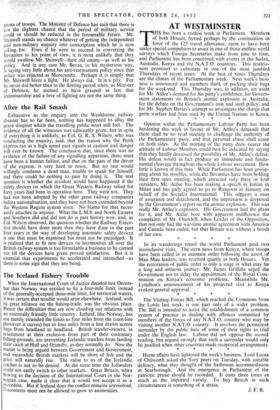After the Rail Smash .
Exhaustive as the enquiry into the Wealdstone railWay disaster has so far been, nothing has happened to allay the grave disquiet which the travelling public must still feel.- The evidence of all the witnesses was admirably given, but-in spite of everything it is unlikely, as Col. G. R. S. Wilson, who was conducting the enquiry, said, that the reason why the Perth express ran at a high speed past signals at caution and danger will ever be known. The conclusion that, since there was no evidence of the failure of any signalling apparatus, there must have been a human failure, and that on the part of the driver of the express, is very hard to resist. But no one would willingly condemn a dead "man, unable to speak for himself, and there could be nothing to gain by doing it.. The real question is whether the accident would have happened if the safety devices on which the Great Western Railway relied for forty years had been in operation here. They were not. They had not been adopted by the other great railway companies before nationalisation, and they have not been extended beyond the Western Region system since. No blame for that neces- sarily attaches to anyone. What the L.M.S. and North Eastern and Southern did and did not do is past history now, and, as Col. Wilson observed, the question whetherthe Railway Execu- tive should have done more than they have done in the past four years in the way of developing automatic safety devices is one that must be examined but must not be prejudged: It is realised that to fit new devices on locomotives all over the British railway system is too formidable a business to be carried out till the devices have given proved satisfaction. But it is essential that experiments be accelerated and intensified—as there is some sign that they are being.


































 Previous page
Previous page